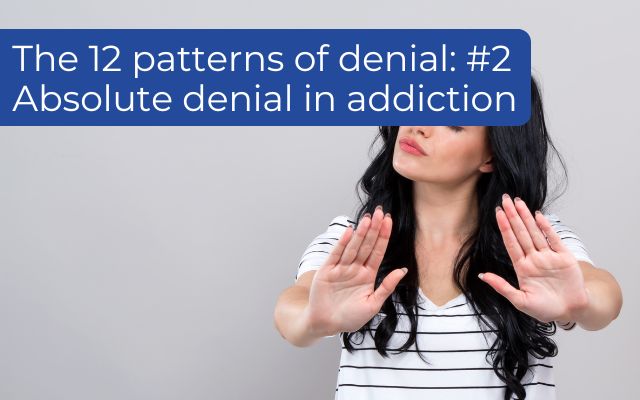
Absolute denial prevents admitting addiction and seeking help
Could absolute denial be stopping you or a loved one from admitting an addiction and accessing appropriate help?
People with addiction or substance abuse problems use different forms of denial to keep themselves in the addictive cycle. Absolute denial in addiction is the most obvious denial strategy i.e., the point-blank refusal to admit they have a problem. Denial can be a dysfunctional protection mechanism which you may use to protect yourself from having to recognise, deal with and accept the reality of what is occurring in your life. This is often unconscious.
To recover from addiction, it is incredibly important to be able to identify denial. The 12 patterns of denial were developed by international addiction expert Terence Gorski.
What is Denial in Addiction?
Denial is the first issue to address when addicted persons enter treatment or try other ways of recovering from their substance use disorder.
Denial is when someone
- Ignores reality
- Downplays reality
- Distorts reality
Reality is painful and difficult, and the addict turns to substances or other addictive behaviours to cope – i.e., to escape.
In the words of Dr Diamond: “The addict cannot tolerate reality… Neither internal reality nor external reality”. “They find reality repugnant, uncomfortable, and overwhelming, and prefer, like the psychotic, withdrawal into fantasy, bliss, or oblivion over reality.”
The first of the 12 steps of Alcoholics Anonymous, and other 12-step programmes, is completely geared at confronting and overcoming denial: We admitted that we were powerless over alcohol/drugs – that our lives had become unmanageable.
Without truly confronting and overcoming denial, no matter how much you want to get better, denial will trip you up and prevent you from recovering. This can be a tricky process because denial comes in so many forms and has become so normalised to the addict that they struggle to even recognise when they are using a given pattern of denial.











What is Absolute Denial in Addiction?
“No, not me! I don’t have a problem”
Absolute denial is the most obvious and common pattern of denial and it goes beyond being unwilling to talk about your addiction. Often addicted people will refuse to even entertain the idea that they have a problem with substances and, even though they know deep down there is a problem, they almost unconsciously choose to pretend it doesn’t exist.
It is as if they stick their heads in the sand – refusing to confront the harm they are doing to both themselves and others through their substance use.
If others attempt to confront a person who using this pattern of denial, they will often ‘play dumb’ or get irritated and argue the subject.
Absolute denial in addiction has also been described as a kind of ‘wishful thinking’.
This pattern is difficult to break in the addict because it is a part of human nature to avoid pain and seek pleasure.
Who wants to experience pain of confronting trauma of our past or even the trauma we have caused to other people?
However, in the addict, their refusal to entertain the fact that they have a serious problem only ends up compounding the amount of pain as they cause more destruction via their addictive behaviours. The longer an addict is unwilling to facing their problem, the more extreme the level of pain they will eventually have to face will get.
It is common for the addict to be the last person to consciously realise they are an addict, while everyone around them is acutely aware.
Addicts have a strong, often unconscious, desire to protect their addiction and will often completely deny they have a problem. This refusal to admit they have an addiction is the first step to overcome in order to start the process of recovery.
Do you know someone who is in absolute denial of their problem? Contact us for help today.
Read more about the 12 patterns of denial below:
- Avoidance in Addiction
- Minimising in Addiction
- Rationalising in Addiction
- Blaming in Addiction
- Comparing in Addiction
- Compliance in Addiction
- Manipulation
- Flight Into Health
- Recovery by Fear
- Strategic Hopelessness
- The Democratic Disease State
Absolute denial in addiction can block getting help and stall recovery, recognise the signs that prevent admitting a problem and start seeking treatment. Changes team counsellors are here to help you.Absolute Denial in Addiction Blocking Recovery Now








